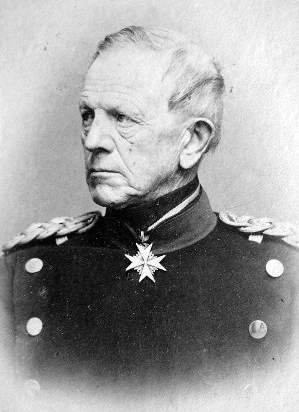Über Strategie (1871). In: Kriegsgeschichtliche Einzelschriften, H.13 (1890), hier zitiert nach: Militārische Werke, Band 2, Teil 2. Mittler & Sohn Berlin 1900. S. 292 books.google https://books.google.de/books?id=WHgvafaY1UIC&pg=PA292dq=gewalt
Helmuth Karl Bernhard von Moltke Berühmte Zitate
am 11. Dezember 1880 in einem Brief an Johann Caspar Bluntschli; wiedergegeben in: Bluntschli, Denkwürdiges aus meinem Leben, 3. Band, Nördlingen 1884, sowie in: ders., Gesammelte kleine Schriften. Band II, Nördlingen 1881 S. 271
„Getrennt marschieren und vereint schlagen“
Zitiert bei Wilhelm Müller: Politische Geschichte der Gegenwart, Bände 4: Das Jahr 1870. Berlin 1871. S. 270
am 14. Mai 1890 in einer Rede als Abgeordneter im Reichstag Protokoll S. 76 oben rechts http://www.reichstagsprotokolle.de/Blatt3_k8_bsb00018664_00182.html
„Einfaches Handeln folgerecht durchgeführt wird am sichersten das Ziel erreichen.“
Verordnungen für die höheren Truppenführer vom 24. Juni 1869. In: Militārische Werke, Band 2, Teil 2. Mittler & Sohn Berlin 1900. S. 171
„Will man angreifen, so muß es mit Entschiedenheit geschehen.“
Aus den Verordnungen für die höheren Truppenführer vom 24. Juni 1869. In: Militārische Werke, Band 2, Teil 2. Mittler & Sohn Berlin 1900. S. 213 books.google https://books.google.de/books?id=WHgvafaY1UIC&pg=PA213 Nr. 15
"Über Strategie" (1871). In: Kriegsgeschichtliche Einzelschriften, H.13 (1890), hier zitiert nach: Militārische Werke, Band 2, Teil 2. Mittler & Sohn Berlin 1900. S. 291 books.google https://books.google.de/books?id=WHgvafaY1UIC&pg=PA291&dq=sicherheit
Aus den Verordnungen für die höheren Truppenführer vom 24. Juni 1869. In: Militārische Werke, Band 2, Teil 2. Mittler & Sohn Berlin 1900. S. 171 books.google https://books.google.de/books?id=WHgvafaY1UIC&pg=PA171 Nr. 1
Helmuth Karl Bernhard von Moltke: Zitate auf Englisch
Kein Operationsplan reicht mit einiger Sicherheit über das erste Zusammentreffen mit der feindlichen Hauptmacht hinaus.
"On Strategy" (1871)/"Über Strategie" (1871), as translated in Moltke on the Art of War: Selected Writings (1993) by Daniel J. Hughes and Harry Bell, p. 92; German collected in: Kriegsgeschichtliche Einzelschriften, H.13 (1890), hier zitiert nach: Militārische Werke, Band 2, Teil 2. Mittler & Sohn Berlin 1900. S. 291 books.google https://books.google.de/books?id=WHgvafaY1UIC&pg=PA291
Paraphrased variants:
No plan survives contact with the enemy.
Paraphrased in The Swordbearers : Studies in Supreme Command in the First World War (1963) by Correlli Barnett, p. 35
No battle plan ever survives contact with the enemy.
As quoted in Donnybrook : The Battle of Bull Run, 1861 (2005) by David Detzer, p. 233
Kontext: The tactical result of an engagement forms the base for new strategic decisions because victory or defeat in a battle changes the situation to such a degree that no human acumen is able to see beyond the first battle. In this sense one should understand Napoleon's saying: "I have never had a plan of operations."
Therefore no plan of operations extends with any certainty beyond the first contact with the main hostile force.
“Strategy is a system of expedients; it is more than a mere scholarly discipline.”
"On Strategy" (1871), as translated in Moltke on the Art of War: Selected Writings (1993) by Daniel J. Hughes and Harry Bell, p. 124
Variants:
War is a matter of expedients.
As quoted in "Nothing Went According To Plan" by Jim Lacey in TIME magazine (15 April 2003)
If in war, from the beginning of the operations, everything is uncertain except such will and energy as the commander carries in himself, there cannot possibly be practical value for strategy in general principles, rules derived from them and systems built up upon the rules. … Strategy is a system of expedients. It is more than science, it is the translation of science into practical life, the development of an original leading thought in accordance with the ever-changing circumstances.
As quoted in Government and the War (1918) by Spenser Wilkinson
As quoted in Prussia : The Perversion of an Idea (1994) by Giles MacDonogh, p. 166 The wordplay with wägen and wagen, weigh and venture ("ehe wäg's dann wag's") is much older than Moltke -->
Kontext: Strategy is a system of expedients; it is more than a mere scholarly discipline. It is the translation of knowledge to practical life, the improvement of the original leading thought in accordance with continually changing situations.
Quelle: See The Jews https://books.google.com.br/books?id=t_RtAAAAMAAJ by Zuhdī Fātiḥ
